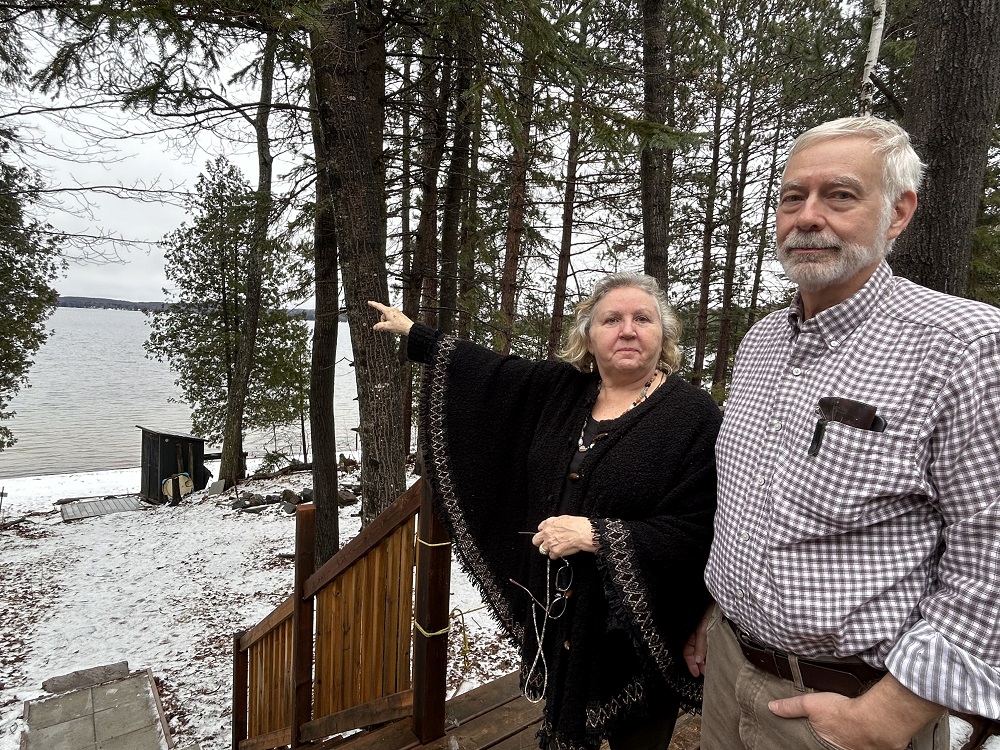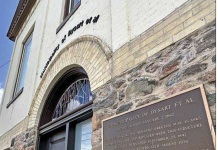After Algonquin Highlands council last week supported the installation of a 91.5 metre tall cell tower on the north side of Boshkung Lake, waterfront residents Robert Harpur and Kathleen Dewar say they’re concerned about the lack of consideration given to maintaining the area’s “naturally scenic beauty.”
The couple live on the south side of Boshkung and say the tower will be visible from every corner of their property.
“Our concern is with the lighting [a requirement through Transport Canada]. We’ll be able to see it from our living room, our dining room, our deck. We won’t be able to escape it no matter where we are on our property,” Harpur said.
It’s the latest tower site as part of the Eastern Ontario Regional Network’s (EORN) cell gap project, a $300 million joint investment between Rogers and the provincial and federal governments to improve coverage, connectivity, and capacity for 99 per cent of residents in the region by 2025.
This tower, one of four planned for Algonquin Highlands, will be located at 1491 Boshkung Lake Rd.
Harpur contends that whatever will be gained won’t make up for what he calls the destruction of the community’s greatest resource.
“People who come to this area generally accept services will not be the same as in the city… people should be prepared to accept a somewhat lower standard of service,” Harpur said. “Many people who aren’t subjected to having to look at the lights on these towers underestimate the impact they will have… having a scenic view is more than just something that’s nice to have, it’s a resource that should be protected for the benefit of the whole township. Once it’s lost, it can never be regained.”
Dewar said while she participated in the public consultation Rogers held in October, there was a feeling of inevitability surrounding the project.
“That we could suffer a great loss and can do nothing about it [is hard to take]. How much power do we have here, as residents of this lake?” she asked.
They called on Rogers to consider an alternate location.
Christian Lee, representing the cellular giant, said due to the nature of the program – designed to improve connectivity for those with rural properties – they need to be constructed close to built-up areas.
“There is simply nowhere where these towers can be built in areas like Algonquin Highlands where nobody can see them… and they still do the job they’re designed to do,” Lee said.
He noted Rogers installs shielding on its towers, but that typically only limits the view for residents close by. For people like Harpur and Dewar, whose home sits several kilometres away, there’s nothing that can be done to protect them. “That technology, unfortunately, doesn’t exist,” Lee said.
Coun. Sabrina Richards felt for the couple, and anyone else who would be impacted. She said a tower overlooking Big Hawk Lake had lighting installed recently, which “lights up the entire sky at night… when I look in that direction, I can’t see a single star.”
Mayor Liz Danielsen reminded council its responsibility is to consider the project from a land use perspective only.
“The federal government has put specific restrictions on what we’re allowed to use as a reason to say no. Unfortunately, aesthetics isn’t one of them,” Danielsen said.
The project does have its supporters – Stephen Orr, owner of Buttermilk Falls Resort, believes the tower will substantially improve his business.
“I have absolutely crap service… the number of times I have to step outside in minus 30-degree weather in the winter to make a call connect is uncounted. The need for the tower, from my perspective, is huge… my customers rely on being able to have good service,” Orr said.
Lee added he felt the availability of enhanced wireless and data services is vital to the Highlands as it continues to grow.
“Going forward, the availability of [these] services will be seen as being just as important as having electricity. This is a vital part of the way people live and work day-to-day,” Lee said.
Council voted 3-2 in favour of the application, with Danielsen, deputy mayor Jennifer Dailloux and coun. Julia Shortreed for, and Richards and coun. Lisa Barry against.





